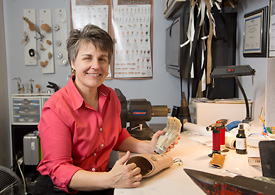Standing atop Independence Pass with a 360-degree view of Colorad, Alicia Davis, cyclist and senior prosthetist-orthotist in the Department of Physical Medicine and Rehabilitation, U-M Health System, holds a picture of one of her young patients in her hand.
“I have a tradition that started with a young patient about 10 years ago. Every time I ride up a mountain, I bring a patient’s picture with me and take a picture at the top of the mountain with them to bring back to them, because sometimes people can’t conceive being able to do something like this, and this is a way to bring them along,” says Davis, also director of the Orthotic and Prosthetic Center Residency Program.

Photo by Scott C. Soderberg, Michigan Photography.
As an undergraduate, Davis initially planned to become an engineer. After befriending Susan Flynn, a quadriplegic she met one day, Davis began to change her mind.
“I realized that becoming a prosthetist would be this perfect marriage between health care, engineering, and creativity, so from the time I was 19 years old this is all I have done,” she says. Working in Boston and New York City before returning to Michigan, Davis helps to create energy-efficient prosthetics for a wide range of people, from children to adults.
Although Davis was an avid cyclist her whole life, she didn’t begin bicycle racing until age 36.
“I can still remember the first time I lined up to race. I was in a total cold sweat and scared to death,” says Davis. She was convinced she would never race after her initial experience. With encouragement from a teammate, however, Davis participated in more races, focusing not on the outcome but on the enjoyment of working as a team.
“The women I rode with really pushed the idea that as a team you can pretty much achieve anything,” says Davis, who admits that while she improved as a racer, she never became great at racing. Continuously training but never reaching a high level of racing helped Davis’ work and interaction with patients as a prosthetist.
“This helped me understand my patients, because their amputations have placed limitations on them. They work extremely hard and they want to be just like they were before, but sometimes don’t quite get there. Like I couldn’t quite get to be an extremely good racer. You just have to change your perspective,” she says.
Davis’ outlook had to change again after she underwent back surgery in 2006. She had to leave the Ann Arbor Velo Club, the organization she had been racing with, since she no longer was able to race. Despite this, she has continued to do long-distance riding. She has completed the One Day Ride Across Michigan and Ride the Rockies several times.
“Everyone in cycling is equal and that’s why I like it. You don’t know if the person riding next to you is a millionaire or doesn’t even own a car. And people have faith in you, and cheer each other on, no matter what.” she says.
The encouragement Davis found from racing is a trait she often finds in her work as well. Usually, when she interacts with patients, she takes on the role of a cheerleader, letting them know that there are no limits.
Similar to cycling, teamwork and encouragement can lead to victory as a prosthetist.
“Patients let you into their lives, and if I do my job right, they get a better quality of life. This little thing that I do can not only make their lives better, but allows them to go out and achieve other things,” she says.
The weekly Spotlight features faculty and staff members at the university. To nominate a candidate, please contact the Record staff at [email protected].

